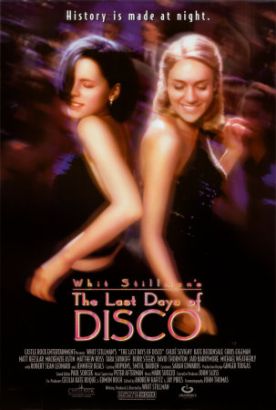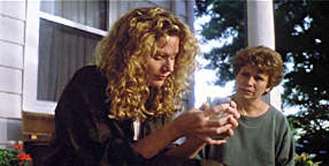Last Days of Disco, The
It’s a lucky thing for me that Whit Stillman, who is an old friend of the American Spectator, makes such good movies. If he made bad ones, I should have to be diplomatic, but that is a necessity which has yet to arise. I thought his first film, Metropolitan (1990) was funny, clever and charming. Barcelona (1994) was all that and more — an ambitious attempt to understand just what it meant to be an American among uncomprehending and sometimes contemptuous foreigners. His new film, The Last Days of Disco, is his best yet. Set in “the very early 1980s,” it is a warm, touching, funny look back at a time when the first young, educated generation to come to maturity after the social devastation of the 1960s and early 70s tried in its own rather feckless and ramshackle way to reconstruct a social life for young adults.
His characters are, in effect, the children of The Ice Storm a few years out of college and working in New York. Their parents have been left behind in the suburbs with their third marriages and their recreational drugs. They have no guidance to offer in the reinvention of courtship rituals, which are to them just hypocritical obstacles in the way of untrammeled sexual gratification. The kids, left to themselves, are not entirely sure that such hypocrisies are necessary or desirable. They, especially the girls, are almost as vulnerable as their older sisters to the charge of “prudery.” But they cling for dear life to what few principles they have been able to salvage from the wreck of social order and decency.
College friends Alice (Chloë Sevigny) and Charlotte (Kate Beckinsale) find themselves working for the same publishing company as assistant editors. Alice is shy, intellectual, conservative in manners and is not even sure she likes the tart-tongued, amoral Charlotte, but they get an apartment together with Holly (Tara Subkoff) — a so-called “railroad apartment” in which all the rooms are in line and there is no hallway. Alice and Charlotte are bitterly mocked by their colleague at work, Dan (Matt Ross), who fancies himself as a radical and a labor organizer. He resents the fact that the girls’ meagre pay from the publisher is supplemented by allowances from their well-to-do parents and that they will probably marry rich professional husbands.
Their circle of friends includes Jimmy (Mackenzie Astin), a young advertising executive who is building his career on his friendship with Des (Chris Eigeman), an assistant manager at a Studio 54 type club who can get him and sometimes the firm’s clients in, despite the hostility to ad men of the doorman, Van (Burr Steers) and the sleazy club owner, Bernie (David Thornton). Des is developing a bad cocaine habit and discarding the many women he sleeps with after he is tired of them by telling them that he thinks he is gay. That way they pity and sympathize with him instead of cursing him. Des is on to Bernie’s crooked ways, but he himself is being protected by a Harvard pal (Des is a dropout) called Josh (Matt Keeslar), now working in the D.A.’s office and compiling a case against Bernie, whose arrest for money-laundering and drugs comes at the film’s climax.
Bernie’s prejudice against ad men (they’re too nice) proves justified as Jimmy is bringing the feds into the club as clients — though neither Jimmy nor Bernie knows it. Jimmy thinks he’s just bringing in clients, characteristically forgetting that the IRS is the firm’s biggest client. Jimmy is thus unwittingly assisting Josh’s investigation of the club and completing a circle of problematical friendships and loyalties, as Jimmy depends on Des and Des depends on Josh. The women are not involved in the working out of this masculine drama. As Josh says to Des, “I consider you a person of some integrity — except, you know, in your relations with women.” Yet their drama takes place quietly in the background, like the women’s publishing careers, behind the sexual dance which is the apparent focus of all these disco-goers.
Josh, who is working to shut the club down, is the paradoxical theorist and self- described “loyal adherent of the disco movement.” The jocular political language suggests ironic mockery of the politically engagé 60s generation, but there is also a serious point behind it for these orphans of the revolution. It is hard not to conclude that Josh is the spokesman for Stillman’s own discomania. And the other characters are only less articulate believers that it is “tremendously important that there be more group social life and not all this ferocious pairing off” — which, even in their young lives, they have learned to look on with great suspicion. Charlotte, in particular, sees the disco as a form of female empowerment and, surveying the crowds of men on the dance floor, remarks that “We’re in complete control. . .Look out there! There are a lot of choices.”
Unfortunately, this does not prevent them from making bad choices once the “ferocious pairing off” begins. Bowled over to think that Tom (Robert Sean Leonard) is interested in her, the virginal and socially awkward Alice turns for advice to the more worldly-wise Charlotte, who gives her instructions in how to be seductive. Alice tries it out on Tom with instant success, only to learn that Tom had been attracted by her innocence. In the light of day, he is repulsed by her seductive patter, picked up from Charlotte, including her affecting to believe that Scrooge McDuck is “sexy.” Witheringly, Tom says: “Is there no limit?” More seriously, their single night of passion results in Alice’s being infected with both gonorrhea and genital herpes. She becomes an instant casualty of the sexual revolution with her first experience of love-making.
Like disco itself, her fragile “virtue” — just listen to the despicable Tom as he savors the word’s quaintness on his tongue — never stood a chance against the crushing force of social anomie. Yet, also like disco, the film is very upbeat and admiring of these young people — even the less admirable ones — for having made an effort to live more ordered and gracious lives than might have been thought possible in a world where Josh is considered “a serious nut case” and sufferer from “religious mania.” It is Des who tells the story of Josh’s “breakdown” in college, which seems to have consisted of his once publicly singing that lovely hymn by Whittier which begins “Dear Lord and Father of Mankind,/Forgive our foolish ways.”
Yet perhaps even Des is capable of being touched by the last two verses of the hymn, which go:
Drop thy still dews of quietness,
Till all our strivings cease:
Take from our souls the strain and stress,
And let our ordered lives confess
The beauty of thy peace.
Breathe through the heats of our desire
Thy coolness and thy balm;
Let sense be dumb, let flesh retire;
Speak through the earthquake, wind, and fire,
O still, small voice of calm.
Josh asks Alice, “Do you think I’m a wacko?” She shakes her head no, then yes. The coyness and playfulness of the gesture is itself a kind of allusion to the “old idea” of marriage which Alice, for understandable reasons, is beginning to think might even have been best after all. At any rate, even Charlotte doesn’t think of Josh’s hymn-singing as all that unusual. She herself, she says, often sings “Amazing Grace,” and then proceeds to do so.
There is a sly self-mockery in all this, as there is in having the final “pairing off” match the two couples who were obviously best suited to each other from the start. Best of all is the final paean to disco, after the closing of the club seems to herald its demise, from those who are given pause by the fact that they have “lived through a period that’s over.” Even now they are able to look forward to the ridicule that will attach to the clothes and some of the music and that campy John Travolta pose from Saturday Night Fever that everyone remembers about the period. The next wave of young people to come along won’t know that “disco was much more and much better than all that” — but our heroes believe that it will come back.
This is a film of tremendous riches, particularly in the writing. By that I don’t just mean that the dialogue is witty — though it is. These days, every third-rate disaster movie gets in comedy writers to drop one-liners in the script like raisins in a pudding. Here the humor is much more allusive and intellectual. One can only guess at what proportion of today’s movie-going audience will see the joke when Bernie says: “I care about ideas deeply. Did you know that my senior paper was on Ernest Hemingway?” Or when radical Dan says of the girls’ railroad apartment that “It was built for tenement families, and now the yuppie ‘roommates’ are crowding them out.” The number of those who will rock with merriment at the image of those poor tenement families — long since removed to the suburbs and upscale neighborhoods — starving outside in the snow cannot, one supposes, be large.
As these examples may suggest, Stillman’s subtle comedy of character and manners is of a quality which has hardly been seen in American movies since poor Preston Sturges breathed his last. And its purposes are not only satirical. I particularly liked the bit where shy Josh warns Alice that “Some men say they won’t take no for an answer, but I’m not like that. I will take no for an answer.”
“OK. No,” says Alice.
“You don’t mean that!” says Josh, aghast.
“No,” says Alice with a smile.
The delicacy with which she punctures his rather charming self-conceit is Stillman’s own, and is often applied to himself and his intellectual style of humor. In one scene, for example, Josh takes the explicatory scalpel so memorably applied to The Graduate in Barcelona to Disney’s Lady and the Tramp. The film, he says, is designed to reinforce the female urge to date bad guys as an obviously bimbo-like Lady chooses the “self- confessed chicken thief and obvious sleazeball,” Tramp. It was obviously meant to “program women to adore jerks.” The film’s only partly mocking seriousness about such manifestations of pop cultural ephemera, which include disco itself, are of its very essence, but it comes together with an ability to laugh at its own moral earnestness. Stillman’s delicate balance between rueful regret and comic self-deflation is a triumph of tone that heralds his arrival as rare artist of the cinema.
Discover more from James Bowman
Subscribe to get the latest posts to your email.








